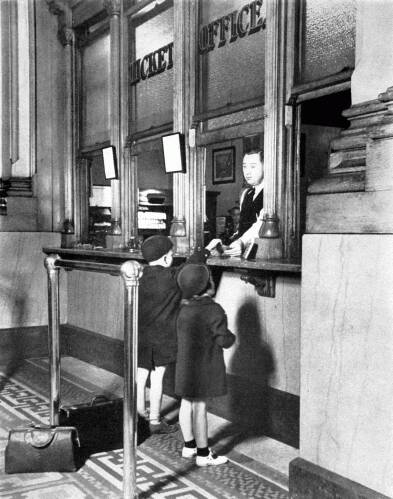|
Buying Tickets in the Station
 When one goes to the movies,
he steps up to the ticket booth and buys a ticket. One does the
same thing before he starts on a railroad journey. In the railroad
station the place where tickets are sold is called the ticket
office. The man who sells tickets is usually called the ticket
agent or the ticket seller. When one goes to the movies,
he steps up to the ticket booth and buys a ticket. One does the
same thing before he starts on a railroad journey. In the railroad
station the place where tickets are sold is called the ticket
office. The man who sells tickets is usually called the ticket
agent or the ticket seller.
The ticket is a receipt for the money one pays for a train
ride. It tells the conductor of the train that the passenger has
paid his fare and is entitled to ride on the train.
There are many kinds of railroad tickets. There are tickets
good for travel in standard coaches; there are others goad for
travel in sleeping and parlor cars. There are one-way tickets
and round-trip tickets. There are round-trip excursion tickets
which sell for less than standard fare tickets. There are commutation
tickets for use in suburban zones of the large cities, good for
10 rides or 25 rides. There are monthly commutation tickets good
for 60 rides during any one month.
And there are coupon tickets—those long, ribbon-like tickets,
sometimes two or three feet in length! Coupon tickets are made
up of a series of "coupons," or detachable tickets,
one for each railroad over which the passenger desires to travel.
A coupon ticket may also include tickets for station-to-station
transfers, steamboat trips or side trips by motor bus. A long
coupon ticket usually denotes a long journey.
A child under 5 years of age when accompanied by a parent or
guardian is allowed to ride free (except when the sole occupant
of Pullman space, in which case one-half railroad fare and full
Pullman fare are charged). Children from 5 to and including 11
years of age ride for one-half as much as is charged for a person
12 years of age or over.
If one wants reserved space in a Pullman sleeping car, he buys
a Pullman ticket, in addition to his regular railroad ticket.
The Pullman ticket entitles him to occupy an upper or lower berth,
a section, roomette, duplex room, bedroom, compartment, drawing
room or a master bedroom, as he desires, in a sleeping car.* Reserved
seats in sleeping cars and parlor cars are purchased in the same
manner.
The ticket agent knows a great deal about cities and towns,
railroads and railroad routes, train schedules, and the prices
of various kinds of tickets. He is always ready and willing to
answer questions. He is polite, courteous, honest and dependable.
He is careful to charge the correct amount for each ticket sold
and to return the proper change to the customer. He keeps a careful
record of sales, and at the end of each day's work his sales and
receipts are carefully checked.
The ticket agent sends his receipts for the day to the treasurer
of the railroad company or deposits the money in the local bank
for his company. The railroad company uses this money and that
received from other agents to pay wages to its workers, to buy
fuel, materials and supplies; also to pay taxes, rents, interest
on bonds, and to meet other necessary expenses.
Railroads never sleep. In some of the larger cities, station
ticket offices are kept open day and night. In smaller cities,
the station ticket office is closed a few hours each night, while
in many towns, villages and country stations one agent is employed
to handle all business and the ticket office is kept open as train
schedules require.
If one boards a train without a ticket—as is sometimes
necessary if the ticket office is closed or if one does not have
time to purchase a ticket and reach the train—the conductor
will collect the fare and give the passenger a receipt which serves
as a ticket.
*Prices of Pullman reservations are published in the passenger
train timetables of many railroads.
I've Been Working
on the Railroad | Contents Page
|







